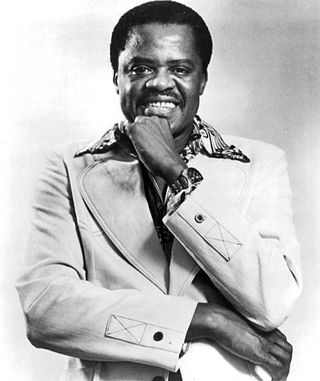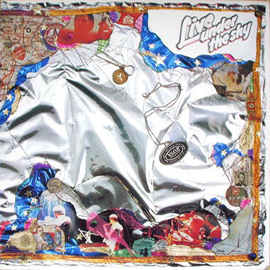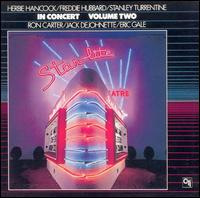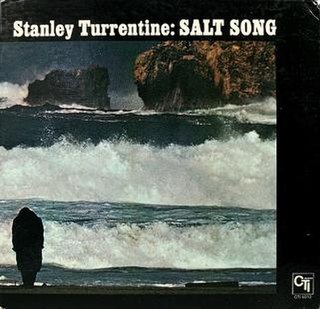
Frederick Dewayne Hubbard was an American jazz trumpeter. He played bebop, hard bop, and post-bop styles from the early 1960s onwards. His unmistakable and influential tone contributed to new perspectives for modern jazz and bebop.

Stanley William Turrentine was an American jazz tenor saxophonist and record producer. He began his career playing R&B for Earl Bostic and later soul jazz recording for the Blue Note label from 1960, touching on jazz fusion during a stint on CTI in the 1970s. He was described by critic Steve Huey as "renowned for his distinctively thick, rippling tone [and] earthy grounding in the blues." In the 1960s Turrentine was married to organist Shirley Scott, with whom he frequently recorded, and he was the younger brother of trumpeter Tommy Turrentine, with whom he also recorded.

The Quintet is an album by V.S.O.P. It was compiled from two concert performances: one at the Greek Theatre, University of California, Berkeley, on July 16, 1977; the other at the San Diego Civic Theatre on July 18, 1977. The quintet were keyboardist Herbie Hancock, trumpeter Freddie Hubbard, drummer Tony Williams, bassist Ron Carter and saxophonist Wayne Shorter. The album was originally released in October 1977 as a 2-disc LP by Columbia Records.

Power to the People is an album by jazz saxophonist Joe Henderson, released on Milestone in 1969. Featuring Henderson with trumpeter Mike Lawrence, pianist Herbie Hancock, bassist Ron Carter and drummer Jack DeJohnette. Hancock's electric piano and Carter's bass guitar are the first electric instruments to appear on a Henderson album.

One Night with Blue Note is a 1985 feature length jazz film directed by John Charles Jopson.

Red Clay is an album recorded in 1970 by jazz trumpeter Freddie Hubbard. It was his first album on Creed Taylor's CTI label and marked a shift toward the soul-jazz fusion sounds that would dominate his recordings in the later part of the decade. It entered at number 20 on Billboard’s Top 20 Best Selling Jazz LPs, on June 20, 1970.

Straight Life is a soul/funk influenced jazz album recorded in 1970 by trumpeter Freddie Hubbard. It was recorded on 16 November 1970 and released between the albums Red Clay (1970) and Sing Me a Song of Songmy (1971). This is also Hubbard's eighteenth overall album.

V.S.O.P : Live Under the Sky is a 1979 live album by the V.S.O.P. Quintet, a record of a performance at the 1979 Live Under the Sky Festival as it was performed live in Japan over two days. The first day, which took place during a furious rainstorm, was broadcast live on national television. The original release featured the first day, while the 2004 re-master/re-release also featured the second concert. This, the fourth VSOP release, once again featured pianist Herbie Hancock, saxophonist Wayne Shorter, drummer Tony Williams, bassist Ron Carter and trumpeter Freddie Hubbard.

The All Seeing Eye is the ninth jazz album by saxophonist Wayne Shorter, recorded on October 15, 1965, and released on the Blue Note label as BLP 4219 and BST 84219 in 1966. The album features performances by Shorter with trumpeter Freddie Hubbard, trombonist Grachan Moncur III, alto saxophonist James Spaulding, pianist Herbie Hancock, bassist Ron Carter and drummer Joe Chambers. Shorter's brother, Alan composed and plays fluegelhorn on the final track, “Mephistopheles”. The AllMusic review by Scott Yanow states: "it is clear from the start that the music on this CD reissue is not basic bop and blues... the dramatic selections, and their brand of controlled freedom has plenty of subtle surprises. This is stimulating music that still sounds fresh over three decades later".

V.S.O.P. is a 1977 double live album by keyboardist Herbie Hancock, featuring acoustic jazz performances by the V.S.O.P. Quintet, along with jazz fusion/jazz-funk performances by the ‘Mwandishi’ band and The Headhunters.

First Light is an album by jazz trumpeter Freddie Hubbard. Recorded in 1971, it features string arrangements by Don Sebesky. It was his third album released on Creed Taylor's CTI label and features performances by Hubbard, Herbie Hancock, Eric Gale, George Benson, Ron Carter, Jack DeJohnette, Airto Moreira and Richard Wyands. The album is part of a loose trilogy including his two previous records at the time, Red Clay and Straight Life. First Light won a 1972 Grammy Award for "Best Jazz Performance by a Group".

In Concert Volume Two is a live album recorded in 1973 by jazz trumpeter Freddie Hubbard, pianist Herbie Hancock and tenor saxophonist Stanley Turrentine. It was recorded in Chicago and Detroit for Creed Taylor's CTI label and features performances by Hubbard, Turrentine, Hancock, guitarist Eric Gale, bassist Ron Carter and drummer Jack DeJohnette.

Blow-Up is a soundtrack album by American jazz pianist Herbie Hancock, featuring music composed for Michelangelo Antonioni's 1966 film Blowup. MGM Records released the album in the United States on 20 February 1967, and in the United Kingdom on 10 May. The album features performances by Hancock, trumpeters Freddie Hubbard and Joe Newman, alto saxophonist Phil Woods, tenor saxophonist Joe Henderson, guitarist Jim Hall, bassist Ron Carter and drummer Jack DeJohnette. Although Jimmy Smith is credited with playing organ on the album, some sources claim it was actually Paul Griffin who was at the sessions.

Together is a 1979 album by jazz pianist McCoy Tyner released on the Milestone label. It was recorded in August and September 1978 and features performances by Tyner with trumpeter Freddie Hubbard, flautist Hubert Laws, tenor saxophonist/bass clarinetist Bennie Maupin, vibraphonist Bobby Hutcherson, bassist Stanley Clarke, drummer Jack DeJohnette and percussionist Bill Summers.

Sugar is an album by jazz saxophonist Stanley Turrentine, his first recorded for the CTI Records label following his long association with Blue Note, featuring performances by Turrentine with Freddie Hubbard, George Benson, Ron Carter, and Billy Kaye with Lonnie Liston Smith added on the title track and Butch Cornell and Richard "Pablo" Landrum on the other two tracks on the original release. The CD rerelease added a live version of the title track recorded at the Hollywood Palladium in 1971.

Salt Song is an album by jazz saxophonist Stanley Turrentine recorded for the CTI Note label featuring performances by Turrentine with an orchestra arranged by Eumir Deodato. The CD rerelease added another track.

Have You Ever Seen the Rain is an album by jazz saxophonist Stanley Turrentine, his third recorded for the Fantasy label, featuring performances by Turrentine with Freddie Hubbard and an orchestra arranged and conducted by Gene Page. The album was rereleased on CD in 1999 combined with Turrentine's 1980 album Use the Stairs as On a Misty Night.

Up with Donald Byrd is an album by American trumpeter Donald Byrd featuring performances by Byrd with Jimmy Heath, Stanley Turrentine, Herbie Hancock and Kenny Burrell recorded in 1964. It was released on the Verve label in 1965 as V/V6 8609.

The Other Side of Round Midnight is an album by American jazz saxophonist Dexter Gordon recorded in 1985 and released on the Blue Note label. The album was recorded during the making of Bertrand Tavernier's 1986 film Round Midnight, and it consists of tracks that were not included in the Academy Award-winning soundtrack album for the film. The album features the last recordings released under Gordon's name, produced and arranged by Herbie Hancock.

Directions is a compilation album by American jazz musician Miles Davis, released in 1981 by Columbia Records. It collects previously unreleased outtakes that Davis recorded between 1960 and 1970. Directions was the last of a series of compilation albums—mostly consisting of, at that time, previously unreleased music—that Columbia released to bridge Davis' recording hiatus that ended with the Man with the Horn in July 1981.




















